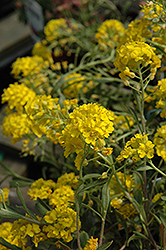It's all about ...
plants

Plant Height: 4 inches
Flower Height: 6 inches
Spread: 18 inches
Sunlight:
![]()
Hardiness Zone: 3a
Other Names: Madwort
Description:
This hardy variety is perfect for edging a sunny border or accenting a rock garden; yellow flower clusters appear above a mounded cushion of leaves in mid to late spring; evergreen in mild winter areas and drought tolerant once established
Ornamental Features
Alpine Alyssum is blanketed in stunning clusters of fragrant yellow flowers at the ends of the stems from mid to late spring. Its tomentose narrow leaves remain grayish green in colour throughout the season.
Landscape Attributes
Alpine Alyssum is an herbaceous perennial with a more or less rounded form. Its relatively fine texture sets it apart from other garden plants with less refined foliage.
This is a relatively low maintenance plant, and should be cut back in late fall in preparation for winter. It is a good choice for attracting bees and butterflies to your yard, but is not particularly attractive to deer who tend to leave it alone in favor of tastier treats. It has no significant negative characteristics.
Alpine Alyssum is recommended for the following landscape applications;
- Accent
- Mass Planting
- Border Edging
- General Garden Use
- Groundcover
- Container Planting
Planting & Growing
Alpine Alyssum will grow to be only 4 inches tall at maturity extending to 6 inches tall with the flowers, with a spread of 18 inches. Its foliage tends to remain low and dense right to the ground. It grows at a medium rate, and under ideal conditions can be expected to live for approximately 5 years. As an herbaceous perennial, this plant will usually die back to the crown each winter, and will regrow from the base each spring. Be careful not to disturb the crown in late winter when it may not be readily seen!
This plant should only be grown in full sunlight. It prefers to grow in average to dry locations, and dislikes excessive moisture. It is not particular as to soil type or pH. It is somewhat tolerant of urban pollution. This species is not originally from North America.
Alpine Alyssum is a fine choice for the garden, but it is also a good selection for planting in outdoor pots and containers. It is often used as a 'filler' in the 'spiller-thriller-filler' container combination, providing a mass of flowers against which the thriller plants stand out. Note that when growing plants in outdoor containers and baskets, they may require more frequent waterings than they would in the yard or garden. Be aware that in our climate, most plants cannot be expected to survive the winter if left in containers outdoors, and this plant is no exception. Contact our experts for more information on how to protect it over the winter months.
